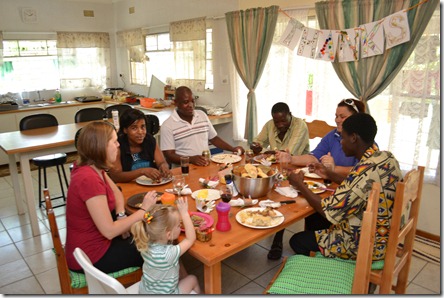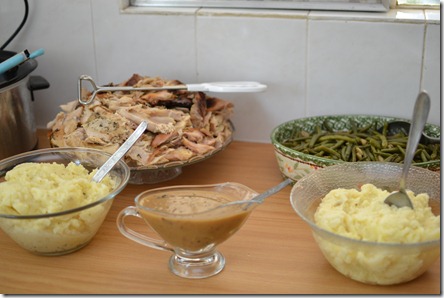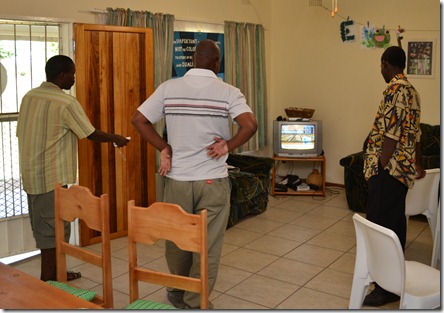Thanksgiving in Swaziland
This has been the first holiday season that I can ever remember where I have been away from family. Growing up, our extended families always lived far away and we only saw them a couple times a year, but when it came to Thanksgiving and Christmas we always committed to long drives and hurried schedules in order to make sure we saw everybody.
We knew celebrating the holidays in Southern Africa could be tough. Not only are we away from family, but the Swazi’s don’t celebrate Thanksgiving. Instead of leaves changing, the coming of cool weather and football on TV, we have torrential downpours (when rain comes), 100+ degree weather and cricket on TV. Plus, most of the traditional Thanksgiving foods are difficult or impossible to find.
BUT… instead of pouting about it, Beth, Mikayla and I made sure we had one of the most memorable Thanksgivings ever.
Thanks to the wonders of technology, we were able to talk with all of our families overseas (even though it meant waking up in the middle of the night, it was worth it). Also, Beth was able to put together a lot of Thanksgiving themed activities for Mikayla including a song that we will try to post on YouTube when we get a chance.
As for having a Thanksgiving meal, our plans changed many times, but ending up being extremely meaningful. At first, we tried to coordinate with several Westerners that we are close with to celebrate this American holiday. However, due to schedule changes and other circumstances, no one besides us was able to attend. So, we extended an invitation to the Swazis that we are closest with. This included several of the mangers, the office staff, and a couple other people from the mission.

When it came to food, Beth in particular was able to pull off some culinary wizardry (I am sure she will post about it on her blog shortly). Although very hard to come by, we tracked down a frozen turkey and some smoked ham. We had traditional mashed potatoes and green beans as well as the most amazing gravy I have ever had (thanks to the sisters!). We had apple sauce, homemade rolls, deviled eggs, a Swazi version of collard greens along with butternut squash, and of course some sweet potatoes. The award for creative substitution came with a variation of homemade pumpkin pie that we made with butternut squash. It was phenomenal and if you didn’t tell me, I wouldn’t have known the difference.

By far the most meaningful part of the entire meal was being able to share it with the Swazis we are closest to. We were able to explain the traditions and also express our gratitude to them for their support and assistance in our transition.
I was particularly struck by the unintentional symbolism that emerged. In America, Thanksgiving is about spending time with family and we originally tried to replicate and share that with other Americans here in Swaziland. However, what ended up happening was much more in line with the first Thanksgiving. Tradition holds that the feast is tied to the Europeans celebrating with the Native Americas as a sign of gratitude for their assistance upon coming to the New World. While the parallels are not perfect, the similarities were striking. We are outsiders who are new here, and were were able to share our gratitude with those those who were already here as a way of saying thanks for helping us make the transition.
After dinner, we all sat around for hours and enjoyed each others company. We introduced the Swazis to the Wii and as it turns out, they are pretty good at bowling!

As the evening wound down, the tone became a bit more intimate. Several of guys who were still around thanked us for sharing the tradition with them. They also expressed the things they were thankful. Esau, our maintenance manager, said he was grateful to be a part of something that was bigger than just the people involved; because we are doing important things, we can work together even if we don’t always agree. Johannes, our agriculture manager said he felt most thankful when he could look back at all the hard work and see the fruits of his labor. He also said he was excited to see how people from different cultures could come and make new creations with current things (he was talking about Dad’s sweet potato recipe in particular). Mzamo, our HR Director, continued this theme by saying he was grateful for how Westerners could come to Swaziland and make things better without having to change the culture.
At the end of the day, I drove everyone back to their homesteads along with leftover plates stacked high. It gave me new appreciation for the dedication it takes for these people to come to work every day walking miles (some up to 6 miles each way) through the bush.
Our first Thanksgiving in Swaziland brought many firsts for us (first holidays away from family, first time cooking a turkey, first butternut squash pie, etc.) and many firsts for the Swazis (first thanksgiving, first time playing wii, first time to eat many of the foods, etc.).
Looking back a day later, I certainly missed seeing all our friends and family during this time, but at the same time, this weekend did more than anything else previously to solidify the notion that we are in the in fact in the right place.
Now we just need to set up our Christmas Tree and get ready for our first summertime Christmas.
Happy Holidays from the Kickerts!
